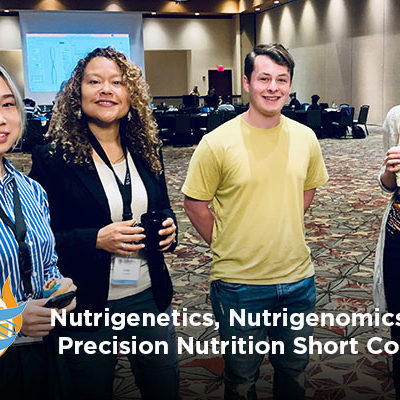Registrants from across the country joined NRI professors in Concord, NC, on May 16 for the first day of a short course on Nutrigenetics, Nutrigenomics, and Precision Nutrition. This course is designed for graduate students, health professionals, and nutrition scientists from academia, agencies, and industry.
Registrants began the first day of the four-day workshop with an overview of nutrigenetics and nutrigenomics delivered by Martin Kohlmeier, MD, PhD, professor of nutrition, UNC Nutrition Research Institute.
Nutrigenetics: Identifying the genetic blueprint that makes each of us respond uniquely to nutrition and what it means for our personal health.
Nutrigenomics: Using molecular tools to understand how nutrients may affect the expression of genes.
Applying these scientific principles together, we can develop precision nutrition. Precision nutrition is the concept that, because people are different from one another, nutrition that works well for one person may not be as effective for someone else. This is due, in part, to each of us having unique variations in our genome that can affect what we require and how we respond to nutrition.
Following the morning’s overview, Brian Bennett, PhD, from the USDA presented his talk, “Genetics Primer.” Bennett familiarized the participants with basic genetic terminology and discussed gene structure, Mendelian inheritance, SNPs, and linkage disequilibrium.
A Mendelian trait is one that is influenced by a single gene producing a clear pattern of dominant or recessive inheritance within families. Some examples of this kind of trait are cystic fibrosis, sickle cell anemia, and hemophilia as well as a person’s height.
SNP stands for single nucleotide polymorphism. The chemical bases in a DNA strand are represented by a sequence of letters (A, T, G, C). A variation in any individual letter in this sequence, creates a SNP. And just one SNP can alter a great deal. “Fun” and “Sun” are different by only one letter but these words have very different meanings.
In population genetics, linkage disequilibrium refers to non-random associations of DNA markers. It is useful for identifying or localizing genes related to disease susceptibility, evaluating population genetic processes – especially in the history of human populations – and in mapping complex disease or trait-associated genes.
Kari North, PhD, professor in the department of epidemiology at UNC-CH, gave a presentation on “Genetics in Nutrition Epidemiology.” She addressed why genetic factors are an important influence on associations between nutritional exposures and health outcomes.
North emphasized the benefits of precision nutrition:
- Improve the health of populations
- Improve athletic performance
- Weight loss and maintenance
- Potential economic impact
The participants ended the day in breakout workshops where they could use the knowledge they had acquired in a practical way. Attendees chose from two workshops: research or practice.
Saroja Voruganti, PhD, associate professor of nutrition, UNC Nutrition Research Institute and the organizer of the short course, led the research workshop. There, participants learned to implement and experiment with statistical methods using their own computers and a dataset provided by the faculty. They also had the opportunity to learn how to interpret and apply their own nutrigenetic data.
Martin Kohlmeier, MD, PhD, led the practice workshop where participants learned to use genetic concepts, common variants, and the occasional haplotype in everyday practice. They also learned how to understand their own nutrigenetic data, review typical case scenarios, and explore specific language for effective messaging.
Day One wrapped up with a welcome dinner where participants networked with one another and the speakers of the conference.
The NGx short course educates current and future NGx researchers, provides cutting-edge research directions and methodologies in NGx, and brings together students, postdocs, faculty (basic scientists and translational researchers), industry researchers, and clinicians in an inclusive environment to foster interactions and networking.

